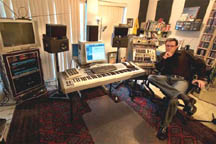
•home
FRED MAHER
With a certain Mac-based application dominating the early days of the transition from analog to digital audio production boosters of the PC platform have typically taken the road less traveled. Fred Maher is no exception; an early adopter of DOS-based sequencer programs who, like many, subsequently made the move to Pro Tools, Maher returned to the PC when he was asked to work with Steinberg’s Nuendo production system on a Korn project in 2001, and has not looked back.
“That changed everything,” Maher admits, “when I found Nuendo and the whole idea of host-based apps, and the idea that I didn’t have to go out and buy ten thousand dollars-worth of DSP cards that were going to be doorstops in a year.” Coincidentally, that was also the session at which Maher first met Tom Bolton of PC AudioLabs, from whom he has just purchased his latest Intel multi-core computer setup. “Tom came in one day and my head was on fire and nothing was working. I was kind of new to PCs and Tom came to the rescue and sorted me out.”
Maher—musician (drummer with ‘70s band Material along with fellow musicians-turned-producers Michael Beinhorn and Bill Laswell, and with Scritti Politti), programmer, composer, engineer, producer, editor, mixer and remixer, consultant—also met Steve Garth, former CEO of Steinberg North America, as a result of his adoption of Nuendo. Maher, Garth and Jayce Murphy have since established OBEDIA (Obedient Media) to provide pro audio clients with the best possible software and hardware service, support and training.
According to Maher, the new system from PC AudioLabs, which features dual Intel quad core processors, has put a lot more power at his fingertips. “I can run more plug-ins, more virtual instruments; there’s just more DSP overhead. I’m able to run bigger sessions more solidly. And then, with 64-bit Windows, it even gets crazier because of the extended memory access.”
Maher’s favored software and hardware includes Waves (he’s a beta tester) and Universal Audio UAD1 plug-ins, Cubase, and, of course, Nuendo. “I do run ProTools,” he reports. “I have an LE system that works great.” Although, he notes, “RTAS is not as efficient as VST so you don’t get the gas on a Pro Tools LE machine that you would out of Cubase or Nuendo.”
As for peripheral hardware: “I use Lynx Audio AES16 audio cards and the Aurora 16 converter card, which is the best stuff out there. I am using a Waves APA [Audio Processing Accelerator], which is an ingenious external box that provides extra DSP for their plug-ins. It takes even more pressure off of the system, but with the dual quad core machine is almost unnecessary.”
Even though, as he says, “I’m a very in-the-box kind of guy,” Maher does use some outboard devices. “I’ve got a couple of vintage analog pres, mostly for capturing the input. Every once in a while I’ll use a compressor as an insert on something like a bass or vocal. It’s weird—so much stuff is amazing in the digital domain, particularly EQs and effects like reverbs and delays, but real world classic compressor emulations are not really there yet.”
The new Intel multi-core processor provides a lot of power for a host-based app, Maher reports. “I did a test in which I was able to run 225 Nuendo multi-band compressors on this machine—pretty amazing. With machines prior to this I would have to start bouncing tracks, but on the 8-core system I have yet to hit the wall in a project. I have tons of overhead and it’s great.”
Maher has already had the opportunity to use the new machine, including a new DTS trailer destined for the new Blu-ray and HD DVD disc formats. “It’s in 96kHz in surround; I used Nuendo for that on the new machine. And I’m going to remix one of BT’s tracks from ‘This Binary Universe’ in 7.1 for demonstration at the AES Convention in Vienna. I’ve also done some songwriting with my significant other, Jennifer Crowe, who is a singer and lyricist.”
PC AudioLabs’ support has been exemplary, according to Maher. “These guys are the best. If I have a question, I just call them up and they can usually sort it out over the phone pretty quickly. I always recommend them to my colleagues when they are looking to get a system built for audio. All that stuff, it’s very difficult for creative people to get involved with.”
He elaborates, “Usually the first mistake people make is that they go to an off-the-shelf consumer computer and try to do audio on it and eventually there is a problem that can’t be fixed. You don’t have to worry about whether a certain kind of interface will work with a certain motherboard—PC AudioLabs worry about that stuff.”
Maher offers a final piece of advice: “It’s always worth it to go that extra five to 10 percent in your budget to get at least close to the latest and greatest technology. With the Intel multi-core chips, there has just been a quantum leap in the power. When you went from a dual Xeon machine to a dual dual core Xeon machine, you literally got a 100 percent jump in performance. And the eight core machines come close to even 100 percent more than the quad cores. So you should always go that little extra in your budget if you can.”
Photo File: Fred_Maher.JPG
Intel is a registered trademark of Intel Corporation or its subsidiaries in the United States and other countries.
* Other names and brands may be claimed as the property of others.
Contact:
Dan Snyder
PR Manager, Intel Corporation
daniel.s.snyder@intel.com
(408) 765-6398

